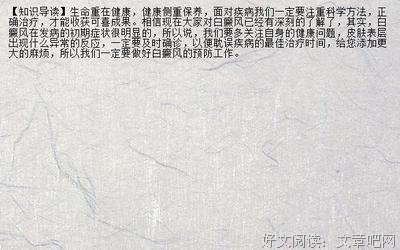大人对孩子的10个误解
原文:Ten Ways We M Ch
作者:Jan Hunt
来源:www.naturalchild.org
We expect ch to be able to do things before they are ready.
让在襁褓中的婴儿保持安静,让2岁的宝宝一直坐好,让3岁的孩子打扫房间,这不是强人所难么?这也是在让我们自己失望,让我们的孩子为了取悦父母而一次次地经历无情的失败和打击。
We ask an to keep quiet. We ask a 2-year-old to sit still. We ask a 3-year-old to clean his room. In all of these s, we are being unrealistic. We are setting ourselves up for an up the child for repeate to please us.
某些父母让孩子做的事情,就算年纪稍大的孩子做起来都会有困难,更何况小孩子?简而言之,我们要求孩子做的事,远远超出了他们的年龄发展水平。
Yet many parents ask their young ch to do things that even an older chil fin. In short, we ask ch to stop acting their age.
We become angry when a chil to meet our needs.
孩子只能做力所能及的事。如果他们做不到我们要求的事,那要求和期望他做得更多或更好显然是不公平也不现实的,另外愤怒只会让事情变得更糟。
A child can only do what he can do. If a chil do something we ask, it is unfair an to expect or more, an only makes things worse.
2岁孩子只能做2岁的事,5岁孩子做不了10岁的事,10岁孩子也不能表现得像个成年人。虽然你的期望是好的,但是真的不现实也没意义。不同年龄段的孩子具有不同的能力水平,我们应该尊重孩子的自然发展规律,拔苗助长只能造成两败俱伤。
A 2-year-old can only act like a 2-year-old, a 5-year-ol act like a 10-year-old, and a 10-year-ol act like an adult. To expect more is unrealistic an. There are limits to what a child can manage, and if we don't accept those limits, it can only result in frustration on both sides.
We m the child's motives.
当孩子不按我们的要求做时,我们就主观臆断是他在反抗,而不是从孩子的角度去看待问题。
If a chil meet our needs, we assume that he is being , of looking closely at the s from the child's point of view, so we can the truth of the matter.
然而事实是,一个“反抗”的孩子有可能正在生病、有可能是累了、饿了、身体难受、或情感受到伤害,或者是因为食物过敏之类看不见的原因。我们不仅忽略了这些可能,反而用大人的“恶意”去揣测孩子。
In reality, a "" child may be ill, tired, hungry, in pain, responding to an emotional or physical hurt, or struggling with a hidden cause such as foo. Yet we seem to overlook these poss in favor of th the worst about the child's "personality".
不禁反问,我们为什么要把孩子往坏处想呢?
解读:我们不允许孩子是个“孩子”。
We don't allow ch to be ch.
成年人早就忘记了自己当小孩的感觉,成年人还希望小孩能表现得像个成年人。可是一个健康的小孩本就是无拘无束、吵吵闹闹、有哭有笑、注意力不容易集中的。
We somehow forget what it was like to be a chil, an the child to act like an adult of acting his age. A healthy child will be rambunctious, noisy, emot expressive, and will have a short attention span.
所以这些“问题”,根本不是问题,只不过是一个正常儿童的正常表现。与之相反,成年人要求儿童做出完美的行为才是不正常的。
All of these "problems" are not problems at all, but are in fact normal qualities of a normal child. Rather, it is our society and our society's expectations of perfect behavior that are abnormal.
解读:我们让事情本末倒置。
We get it backwards.
我们一味地要求孩子满足我们的需要:要安静,要睡整觉,要听话……却忘了去履行父母角色的天职——满足孩子的需要。
我们只看到了自己的需要没被满足,是否想过孩子也有他自己的需要?孩子的需要满足了么?
We expect, an, that the child meet our needs - for quiet, for un sleep, for obe to our wishes, and so on. of accepting our parental role to meet the child's needs, we expect the child to care for ours. We can become so focused on our own unmet needs an that we forget this is a child, who has needs of his own.
We blame an when a chil a m.
首先,小孩没有太多生活经验,犯错在所难免。其次,对任何年龄的人来说,犯错都是学习的好机会。可是我们非但不理解和帮助孩子,还批评责怪他,好像任何事他都应该一举成功。
Ch have had very little experience in life, and they will make m. M are a natural part of learning at any age. of un an the child, we blame him, as though he should be able to learn everything perfectly the first time.
人非圣贤,孰能无过。年轻时就是会犯错。然而,面对孩子犯的错,我们却表现出好像“孩子就该十全十美”一样的震惊和失望。别说孩子了,难道大人就不会犯错么?
To err is human; to err in ch is human an. Yet we react to each m, of a rule, or m with surprise an. It makes no sense to un that a child will make m, and then to react as though we think the chil behave perfectly at all times.
解读:我们忘了批评对孩子的伤害有多大。
We forget how blame an can hurt a child.
许多父母意识到,身体伤害是有害的,然而很多人却忘记了愤怒的言语、侮辱和责备一样能伤人于无形。特别是对于一个只能将错误归结到自己的孩子来说,批评和言语的伤害会造成非常大的痛苦和危害。
Many parents are coming to un that phys hurting a child is wrong an, yet many of us forget how painful angry words, , an can be to a child who can only believe that he is at fault.
解读:我们忘了爱的力量。
We forget how healing loving actions can be.
我们陷入责备和犯错的恶性循环,却忘了停下来给孩子无条件的爱、暖心的安抚、平等的尊重,拥抱的安全感和如沐春风的良言。
We fall into v cycles of blame an, of stopping to give the child love, reassurance, self-esteem, an with hugs and kin.
解读:我们忘了“身教胜于言传”。
We forget that our behavior provides the most potent lessons to the child.
“说什么不重要,重要的是我们做什么。”父母的行为对孩子更具影响力。当一个打孩子的父母教育孩子说“打人是不对的”,这显然没什么效果。因为他正用自己的行为告诉孩子:有权力的人就能打人。
It is truly "not what we say but what we do" that the chil to heart. A parent who hits a child for h, telling him that h is wrong, is in fact teaching that h is right, at least for those in power.
用和平方式处理问题的父母才能教出心态平和的孩子。所谓“有问题的时候,是教育的最佳时机”。孩子只有在真实的情境中学习真实的人和事物,才有最佳的学习效果。
It is the parent who responds to problems with peaceful solutions who is teaching his child how to be a peaceful adult. So-calle present our best opportunity for teaching values, because ch learn best when they are learning about real things in real life.
解读:我们只看到外在的行为,忽视了孩子内心的爱和美好用意。
We see only the outwar, not the love and goo the child.
当孩子的行为让我们感到失望时,我们应该多往好处想。要相信孩子的用意是好的,只不过由于年龄、能力和生活经验的限制,或者其他一些原因才造成现在的局面,而这已经是孩子力所能及的最好的表现。
When a child's behavior us, we should, more than anything else we do, "assume the best". We shoul assume that the chil well and is behaving as well as possible cons all the c (whether obvious or unknown to us), together with his level of experience in life.
当我们总是对孩子抱以好的期待,孩子就会尽力做好事情。当我们无私地给予爱,就会收获更多的爱。
If we always assume the best about our child, the child will be free to do his best. If we give only love, love is all we will receive.
- END -
蒙氏清洁套装、食品准备套装、小农夫亲子种植套装、蒙氏亲子手工盒等,只要通过家长大学平台渠道购买,通通有优惠哦!
保存下图卡片,按照卡片提示操作即可~
蒙氏食品准备(榨汁器):
蒙氏食品准备套装&清洁套装:
小农夫亲子菜园种植套装:
蒙氏手工游戏盒:
有任何问题,可以在公众号或文章下面留言~
